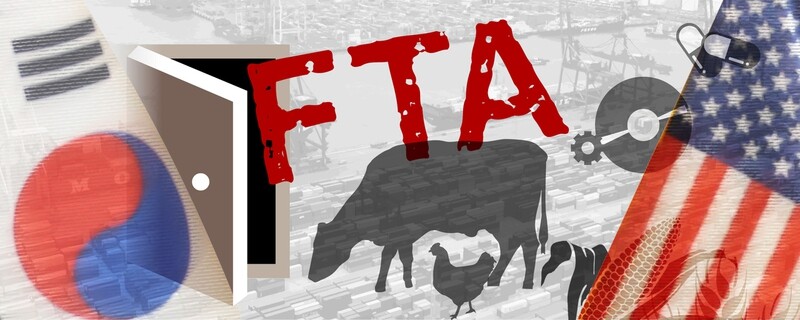hankyoreh
Links to other country sites 다른 나라 사이트 링크
Report outlines amendment scenarios for KORUS FTA

Three to four “highly realistic” amendment scenarios for the South Korea-US Free Trade Agreement (KORUS FTA) are being considered in a report on the economic feasibility of changes to the agreement, including additional openness in sensitive agricultural product areas and looser conditions on service and investment sector openness. The South Korean government plans to publish the report at a KORUS FTA amendment hearing scheduled for Nov. 10.
Sources with the state economic think tanks in charge of the report’s drafting said on Nov. 2 that one major scenario under examination would involve pursuing “additional openness and early tariff abolition” above current tariff concession levels, moving up the tariff abolition timeline for hundreds of manufacturing items and including additional openness for some “sensitive” agricultural products.
“Rice was not included among the concessions,” noted one source participating in the report’s drafting. “But the [scenarios] are including additional tariff schedules for sensitive items [protected through long-term tariff abolition schedules of 15 years or more] in agricultural and other products, and possible additional openness for [products where duties are still in place] based on a long concession period and incremental opening.”
The announcement is expected to generate some shock waves, as it differs from trade authorities’ initial position that agriculture was a “red line” that could not be crossed. The same source said that “additional openness in the form of looser conditions on entering the South Korean market is being reflected and considered in the scenarios.”
Trade ministers reportedly provided the team drafting the report with a prediction of how the existing concessions for several sensitive items could change in future negotiations based on a list of demands from the US, along with amendment opinions for individual domestic industries.
By Cho Kye-wan, staff reporter
Please direct questions or comments to [english@hani.co.kr]

Editorial・opinion
![[Column] Season 2 of special prosecutor probe may be coming to Korea soon [Column] Season 2 of special prosecutor probe may be coming to Korea soon](https://flexible.img.hani.co.kr/flexible/normal/500/300/imgdb/original/2024/0426/3317141030699447.jpg) [Column] Season 2 of special prosecutor probe may be coming to Korea soon
[Column] Season 2 of special prosecutor probe may be coming to Korea soon![[Column] Park Geun-hye déjà vu in Yoon Suk-yeol [Column] Park Geun-hye déjà vu in Yoon Suk-yeol](https://flexible.img.hani.co.kr/flexible/normal/500/300/imgdb/original/2024/0424/651713945113788.jpg) [Column] Park Geun-hye déjà vu in Yoon Suk-yeol
[Column] Park Geun-hye déjà vu in Yoon Suk-yeol- [Editorial] New weight of N. Korea’s nuclear threats makes dialogue all the more urgent
- [Guest essay] The real reason Korea’s new right wants to dub Rhee a founding father
- [Column] ‘Choson’: Is it time we start referring to N. Korea in its own terms?
- [Editorial] Japan’s rewriting of history with Korea has gone too far
- [Column] The president’s questionable capacity for dialogue
- [Column] Are chaebol firms just pizza pies for families to divvy up as they please?
- [Column] Has Korea, too, crossed the Rubicon on China?
- [Correspondent’s column] In Japan’s alliance with US, echoes of its past alliances with UK
Most viewed articles
- 1[Column] Season 2 of special prosecutor probe may be coming to Korea soon
- 2‘We must say no’: Seoul defense chief on Korean, USFK involvement in hypothetical Taiwan crisis
- 3No good, very bad game for Korea puts it out of Olympics for first time since 1988
- 4Division commander ordered troops to enter raging flood waters before Marine died, survivor says
- 5Is Japan about to snatch control of Line messenger from Korea’s Naver?
- 6Korea’s 1.3% growth in Q1 signals ‘textbook’ return to growth, says government
- 7Is N. Korea threatening to test nukes in response to possible new US-led sanctions body?
- 8[Editorial] Korea’s surprise Q1 growth requires objective assessment, not blind fanfare
- 9[Editorial] New weight of N. Korea’s nuclear threats makes dialogue all the more urgent
- 10‘Weddingflation’ breaks the bank for Korean couples-to-be